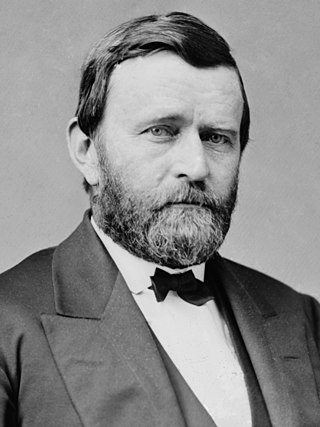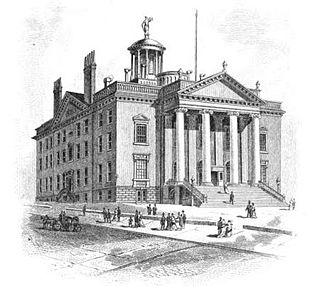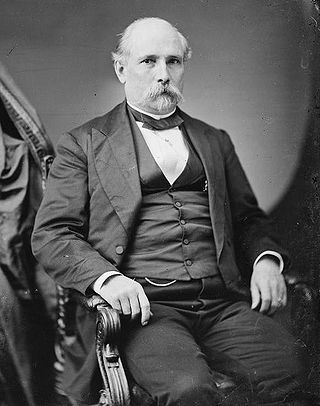
The Fifteenth Amendment to the United States Constitution prohibits the federal government and each state from denying or abridging a citizen's right to vote "on account of race, color, or previous condition of servitude." It was ratified on February 3, 1870, as the third and last of the Reconstruction Amendments.

The 1868 United States presidential election was the 21st quadrennial presidential election, held on Tuesday, November 3, 1868. In the first election of the Reconstruction Era, Republican nominee Ulysses S. Grant defeated Horatio Seymour of the Democratic Party. It was the first presidential election to take place after the conclusion of the American Civil War and the abolition of slavery. It was the first election in which African Americans could vote in the reconstructed Southern states, in accordance with the First Reconstruction Act.

George Washington McCrary was a United States representative from Iowa, the 33rd United States Secretary of War and a United States circuit judge of the United States Circuit Courts for the Eighth Circuit.

Adolph Edward Borie was a United States merchant and politician who briefly served (1869) as Secretary of the Navy in the Ulysses S. Grant administration.

John Potter Stockton was a New Jersey politician who served in the United States Senate as a Democrat. He was New Jersey Attorney General for twenty years, and served as United States Minister to the Papal States from 1858 to 1861.
Iowa's 6th congressional district is a former U.S. congressional district in the State of Iowa. It existed in elections from 1862 to 1992, when it was lost due to Iowa's population growth rate being lower than that of the country as a whole.

The 1860 New York state election was held on November 6, 1860, to elect the governor, the lieutenant governor, a Canal Commissioner, and an Inspector of State Prisons, as well as all members of the New York State Assembly. Besides, the question of Negro suffrage was asked, and was answered in the negative with 197,503 votes for and 337,984 against it.

The 1869 New York state election was held on November 2, 1869, to elect the Secretary of State, the State Comptroller, the Attorney General, the State Treasurer, the State Engineer, two Judges of the New York Court of Appeals, a Canal Commissioners and an Inspector of State Prisons, as well as all members of the New York State Assembly and the New York State Senate. Besides, the amended State Constitution was rejected with 223,935 votes for and 290,456 against it. Only the "Judicial Article" which re-organized the New York Court of Appeals was adopted by a small majority, with 247,240 for and 240,442 against it.
Taieri is a parliamentary electorate in the Otago region of New Zealand, initially from 1866 to 1911, and was later recreated during the 2019/20 electoral redistribution ahead of the 2020 election.

The 1869 United States Senate election in New York was held on January 19, 1869, by the New York State Legislature. Incumbent Senator Edwin D. Morgan stood for a second term in office, but lost the support of the Republican legislative caucus in favor of Reuben Fenton.
Members of the New South Wales Legislative Assembly who served in the sixth parliament of New South Wales held their seats from 1869 to 1872. The 1869–70 election was held between 3 December 1869 and 10 January 1870 with parliament first meeting on 27 January 1870. There were 72 members elected for 52 single member electorates, 6 two member electorates and 2 four member electorates. Due to a change in the Constitution of New South Wales the maximum term of this parliament was reduced from 5 years to 3. However the assembly was dissolved after only 25 months after the third government of Sir James Martin lost a vote of supply. The Speaker was William Arnold.

The 1868–69 United States Senate elections were held on various dates in various states. As these U.S. Senate elections were prior to the ratification of the Seventeenth Amendment in 1913, senators were chosen by state legislatures. Senators were elected over a wide range of time throughout 1868 and 1869, and a seat may have been filled months late or remained vacant due to legislative deadlock. In these elections, terms were up for the senators in Class 1.

The 1874–75 United States Senate elections were held on various dates in various states. As these U.S. Senate elections were prior to the ratification of the Seventeenth Amendment in 1913, senators were chosen by state legislatures. Senators were elected over a wide range of time throughout 1874 and 1875, and a seat may have been filled months late or remained vacant due to legislative deadlock. In these elections, terms were up for the senators in Class 1.

The 1866–67 United States Senate elections were held on various dates in various states. As these U.S. Senate elections were prior to the ratification of the Seventeenth Amendment in 1913, senators were chosen by state legislatures. Senators were elected over a wide range of time throughout 1866 and 1867, and a seat may have been filled months late or remained vacant due to legislative deadlock. In these elections, terms were up for the senators in Class 3.

The 92nd New York State Legislature, consisting of the New York State Senate and the New York State Assembly, met from January 5 to May 11, 1869, during the first year of John T. Hoffman's governorship, in Albany.
The 1869 United States Senate election in Massachusetts was held on January 19, 1869. Incumbent Charles Sumner was re-elected to a fourth term in office.

The 1869 Mississippi gubernatorial election was held on November 30, 1869, in order to elect the Governor of Mississippi. James L. Alcorn, Republican and moderate planter who had previously served in the Confederate Army, defeated National Union Republican Party nominee Judge Lewis Dent, the brother-in-law of President Ulysses S. Grant and former Union Army official. The Democratic Party supported Dent rather than nominating their own candidate. It was the first election following the Reconstruction era military governorship of Adelbert Ames.